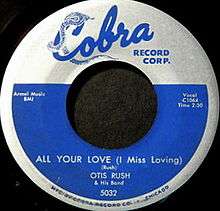All Your Love (I Miss Loving)
| "All Your Love (I Miss Loving)" | ||||
|---|---|---|---|---|
 | ||||
| Single by Otis Rush | ||||
| B-side | "My Baby's a Good 'Un" | |||
| Released | 1958 | |||
| Format | 7-inch 45 rpm record | |||
| Recorded | 1958 | |||
| Studio | Cobra, Chicago | |||
| Genre | Blues | |||
| Length | 2:36 | |||
| Label | Cobra (no. 5032) | |||
| Songwriter(s) | Otis Rush | |||
| Producer(s) | Willie Dixon | |||
| Otis Rush singles chronology | ||||
| ||||
"All Your Love (I Miss Loving)" or "All Your Love" is a blues song written and recorded by Chicago blues guitarist Otis Rush in 1958.[1] Of all of his compositions, it is the best-known with versions by several blues and other artists.[2] "All Your Love" was inspired by an earlier blues song and later influenced other popular songs.
Composition and recording
"All Your Love" is a moderate-tempo minor-key twelve-bar blues with Afro-Cuban rhythmic influences. An impromptu song "apparently dashed off ... in the car en route to Cobra's West Roosevelt Road studios",[3] it borrows guitar lines and the arrangement from "Lucky Lou", a 1957 instrumental single by blues guitarist Jody Williams (Argo 5274).[4] The song alternates between guitar and vocal sections, with an instrumental bridge performed as a faster-tempo twelve-bar shuffle featuring Rush's guitar solo.
The song was produced by Willie Dixon and features Rush on guitar and vocal, Dixon on bass, Ike Turner on second guitar, Little Brother Montgomery on piano, Harold Ashby and Jackie Brenston on saxophones, and Billy Gayles on drums. When "All Your Love" was released in 1958 on Cobra Records, it was Rush's last single for the label. Rush subsequently recorded several studio and live versions of the song, including one released on his Blues Interaction – Live in Japan 1986 album.
Recognition and influence
In 2010, Otis Rush's "All Your Love (I Miss Loving)" was inducted into the Blues Foundation Hall of Fame, which noted that Rush's song "was the obvious inspiration for Bob Dylan's recent track "Beyond Here Lies Nothin'"".[5] In various interviews, Peter Green acknowledged being influenced by "All Your Love"' when he wrote the rock classic "Black Magic Woman",[6] which became a major hit for Santana. According to Carlos Santana, "If you take the words from 'Black Magic Woman' and just leave the rhythm, it's 'All Your Love'—it's Otis Rush".[7]
Recordings by other artists
A variety of musical artists have recorded "All Your Love", including[8] John Mayall and the Bluesbreakers from the album Blues Breakers with Eric Clapton (1966) as well as 70th Birthday Concert (2003), Aerosmith from Pandora's Box (1977, released 1991), Stevie Ray Vaughan from In the Beginning (1980, released 1992), Buddy Guy from DJ Play My Blues (1982), Gary Moore from Still Got the Blues (1990), Rick Derringer on Jackhammer Blues (2000) and the Steve Miller Band from Bingo! (2010).
References
- ↑ Magic Sam wrote and recorded a different "All Your Love" (Cobra 5013) in 1957.
- ↑ Snowden, Don (1993). The Cobra Records Story (Box set booklet). Various Artists. Nashville, Tennessee: Capricorn Records. p. 16. OCLC 28454129. 9 42012-2.
- ↑ Dahl, Bill (1996). "Otis Rush". In Erlewine, Michael. All Music Guide to the Blues. San Francisco: Miller Freeman Books. p. 229. ISBN 0-87930-424-3.
- ↑ Morris, Chris (February 16, 2002). "Declaration of Independents". Billboard. Nielsen Business Media. 114 (7): 56. ISSN 0006-2510.
- ↑ Blues Foundation (November 10, 2016). "2010 Hall of Fame Inductees: All Your Love (I Miss Loving) – Otis Rush (Cobra, 1958)". The Blues Foundation. Retrieved February 7, 2017.
- ↑ Celmins, Martin (1998). Peter Green: Founder of Fleetwood Mac. Sanctuary Publishing. p. 73. ISBN 1-86074-233-5.
- ↑ Aykroyd, Dan; Manilla, Ben (2004). Elwood's Blues: Interviews with the Blues Legends & Stars. Backbeat Books. p. 145. ISBN 978-0-87930-809-4.
- ↑ "Song Search Results for All Your Love (I Miss Loving)". AllMusic. Retrieved July 2, 2014.